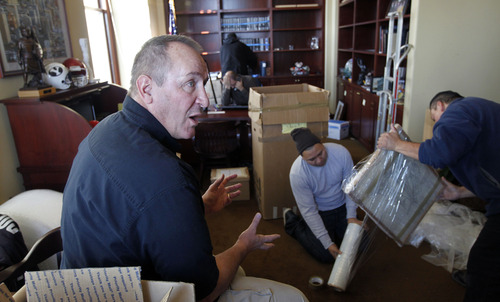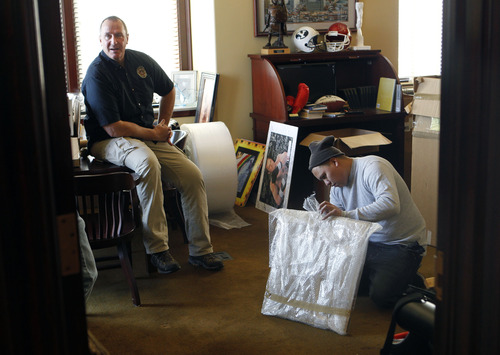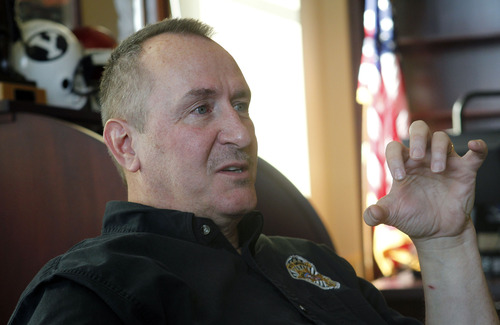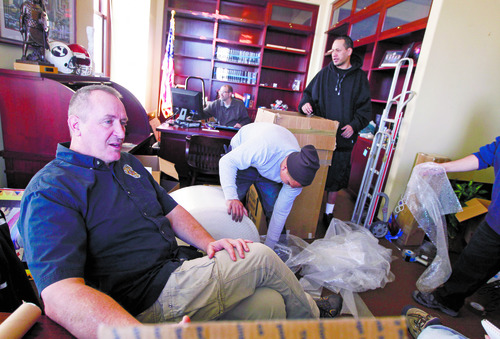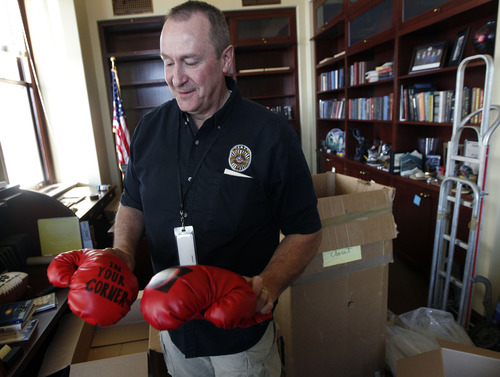This is an archived article that was published on sltrib.com in 2013, and information in the article may be outdated. It is provided only for personal research purposes and may not be reprinted.
It seemed that whatever item Mark Shurtleff pointed to in his office, it held a story of second chances.
There's the twice-autographed Arnold Friberg painting. The once-confiscated and then-returned Golden Spike desk ornament commemorating completion of the Transcontinental Railroad in Utah. And then there's the Aztec Eagle medal — bestowed on him by then-President Vicente Fox of Mexico in 2006 and the highest honor that government can give to a non-Mexican.
It was all being packed up Thursday morning — mover Jose Chavez preparing to bubble-wrap the medallion ensconced in a display case — as Shurtleff finished out the last of his days as Utah attorney general.
Shurtleff asked Chavez if he knew the story of what happened to the medal. Of course, Chavez didn't. Of course, Shurtleff was going to tell it to him.
Shurtleff, dressed in tan parachute pants, a black shirt and sneakers, told Chavez that after he got it, he took it to a friend in Springville to have it framed.
"Guess what happened?" Shurtleff asked. "It was stolen. Someone broke into the studio. They stole La Águila Azteca."
"Oh crap," Chavez said, studying the encased ornament.
"So, it was gone for two years," Shurtleff said. "And I didn't want to tell Mexico because I'd be like 'Can I get another one because mine got stolen?' I thought they'd be mad at me."
The other two movers packing boxes had slowed down to listen in. Shurtleff smiled at the growing audience.
"So they say Mexico is dangerous but it got stolen in Springville, Utah," Shurtleff said. "So, two years later — two years — I get a call from the man saying he came to work one morning and found a paper bag on the front step of his shop. Águila Azteca was in there."
The attorney general was still smiling. Chavez gave it another look and began wrapping it up. The movers began rolling 12 years of his life out the door on dollies and into storage. For the first time in a long time, Shurtleff wouldn't be an elected official. Instead, he'll start with a law firm, splitting his time between Washington, D.C., and Utah.
"I'm a little nervous," he said. "Will I be any good in private practice?"
—
Shurtleff's style • When Attorney General-elect John Swallow is sworn in Monday, Utah will get as deep a contrast in styles as one can imagine from the post's new occupant.
Swallow is a taciturn, reserved man who eschews the public eye. The 55-year-old Shurtleff, by comparison, can seem like a reality television star prone to polarizing audiences the moment he speaks.
Or tweets.
In his three terms, Shurtleff has been prolific and controversial on Twitter, outspoken against conservatives in his own party on gay rights and immigration, enraged at critics and media questioning ethics amid his fundraising prowess and very public about his recoveries from a motorcycle crash that smashed his leg and a diagnosis of advanced colon cancer.
That last one, coming in 2010, shattered his sense of immortality.
"It was a shock. Motorcycle accidents, 25 surgeries — busted my sternum and ribs — I've done a lot of stuff like that. Scuba diving, jumping out of planes — but I never thought I could be killed," Shurtleff said. "It never entered my mind. But then the doctor says you have a 50 percent chance of dying without chemo. Really? What is [the chance of survival] with chemo? He says, 'Maybe 60 [percent].' What? Sixty? I want to hear 90. It was an eye-opener. Yeah, I'm mortal."
It was during that cancer treatment that Shurtleff tapped out one of several tweets that dogged him and, at one point, had his staff confiscate his smartphone and limit his social media interactions for a while.
Debra Brown was convicted in the 1993 murder of 75-year-old Lael Brown and was sentenced to life in prison. But a judge in 2011 found her factually innocent of the crime and, from his hospital bed, Shurtleff tweeted.
"In the interest of justice and mercy, the time has come to bring closure to Debra Brown and everyone," he wrote.
That set off a flurry of meetings and eventually a press conference where Shurtleff recanted his tweet and explained that his office would appeal the judge's decision. Paul Murphy, his longtime spokesman, said it was one of many examples where Shurtleff's gut reaction was on public display.
"When I first started working for him, one of my big fears was about how this guy cries all the time," Murphy said. "He wears his heart on his sleeve, and people attack that vulnerability. That's the thing that hurts the most — he's attacked in the area that's the strongest part of his character."
Shurtleff said it's always been a delicate balance between being the state's top law enforcer and staying true to his human instincts.
"I was letting my emotions inform my decision in that regard. The problem is, in this job, you can't make decisions based on emotion — it has to be on the law and facts," he said. "After my wife and I saw 'Les Miz' — which is about justice and mercy — I immediately thought of Debra Brown. Was I so much rule of law, the law and the facts that I couldn't bring in the mercy? That became the big question."
To this day, he said the main concern was about the precedent set by the factual-innocence statute and what the judge's decision meant to future cases.
He said then — and now — that he's not that interested in seeing Brown return to jail.
"This isn't Javert — 'prison, damn it! That's the only thing that's good for you!' " Shurtleff said. "This was the very first time factual innocence had been used by a judge, and the argument to me was he didn't follow the statute."
But Shurtleff has used Twitter the other way, too. In 2010, he tweeted about the execution of Ronnie Lee Gardner.
"I just gave the go-ahead to Corrections director to proceed with Gardner's execution. May God grant him the mercy he denied his victims," Shurtleff tweeted. In hindsight, he said he was still new to the social-media scene and might've done things differently.
—
Immigration wars • In 2010, it was Stephen Sandstrom facing off against Shurtleff over Utah's enforcement-only immigration law.
Sandstrom, a Republican state representative from Orem, had crafted a bill inspired by Arizona's SB1070 law that required local police to check the legal status of people they pulled over. Shurtleff didn't like the law and battled its passage.
But Sandstrom, who has since come around closer to Shurtleff's position on illegal immigration, said at the time they had a series of private sit-down meetings to discuss the issue.
"Mark is an extremely caring person and on the issue he wanted to push it and let the chips fall where they may," Sandstrom said. "We talked a lot, and many of the changes I made to my bill came because of those meetings."
The friendship was tested when, in December 2011, a group of lawmakers sought to bring in private lawyers to defend Utah's enforcement-only law HB497. Shurtleff was incensed and, after talking with Sandstrom, the legislator said he would only support the attorney general defending his law in court.
One of those who thought Shurtleff wouldn't defend the law — which will now be argued in federal court on Feb. 5 — was Chris Herrod, a former Republican state representative from Provo.
He thought Shurtleff had been tepid in defending it in court.
"He met the bare minimum of what he was supposed to do," Herrod said.
Shurtleff argued he has been defending HB497 vigorously because it isn't the same as SB1070. He also has been a force on immigration reform — in the state and nationally — by helping craft The Utah Compact and testifying for Sen. Luz Robles, D-Salt Lake City, on her legislation that sought to grant work permits to undocumented immigrants in Utah.
Robles said his role in the immigration debate can't be overstated and pointed to his support for in-state tuition for illegal immigrants, support for driver-privilege cards and backing Utah's guest worker law HB116 — set to take effect in July, though there are rumblings the Legislature will revise the measure.
"He is literally a hero in the Hispanic community," Robles said. "Even in the worst moments of his party and the chaos of the anti-immigration movement, he has always been on the same message and I have tons of respect for him doing that."
—
Moving on • Swallow met with Shurtleff in his office Thursday afternoon and noted that, as attorney general, he'll take a pay cut from $71 an hour to $49 an hour. Shurtleff countered that, when he joins the Troutman Sanders law firm, he'll make a far bigger salary.
But he said he wonders about the impact he'll have on lives. At a recent meeting of Safety Net — a group established in 2003 by Shurtleff to build bridges between polygamists and opponents — Anne Wilde, a polygamy proponent, made him a scrapbook and hugged him and had her photo taken with him.
Shurtleff, at times getting teary-eyed as he was lauded at the meeting, quoted Rudyard Kipling's "The Ballad of East and West" — a poem about enemies finally meeting. He smiled at an update about a boy he knew who was abandoned by his polygamy-practicing mother and is now an adult in the U.S. Navy and who just bought a house.
"I'll never have anything that compares to this job — knowing you've had an impact one way or another on people's lives, saving people's lives … whether it's the work we did on meth or substance abuse or suicide prevention or Internet crimes against children ... that gives me great satisfaction," he said.
One thing about the public job he won't miss is the constant scrutiny by some news reporters he believes are hostile to him. Shurtleff is a big defender of the media in general but believes some of the coverage about campaign donors who have been crosswise with state regulators or charged by federal prosecutors has been malicious and irresponsible.
Still, when asked if he would ever run for office again, the outgoing attorney general and former Salt Lake County commissioner said he wouldn't rule it out. He also said he hasn't made any plans to "get out, make money and come back in six years."
That, coincidently, would be when Sen. Orrin Hatch would finish what he has said will be his last term in the U.S. Senate.
Twitter: @davemontero






